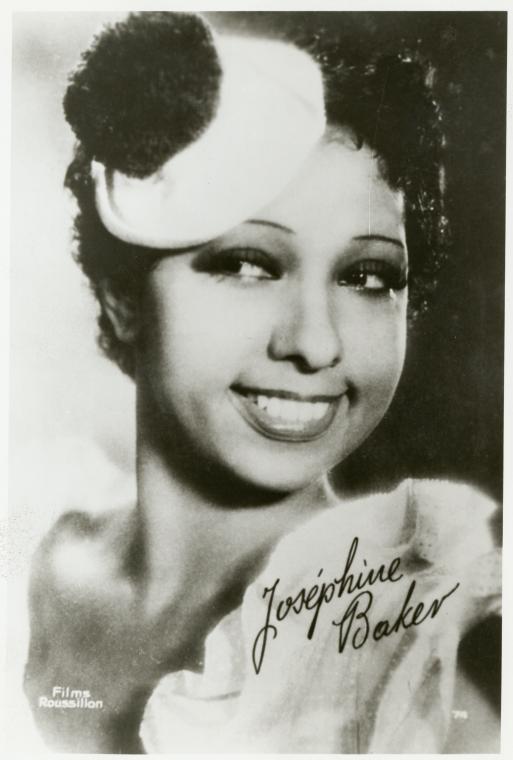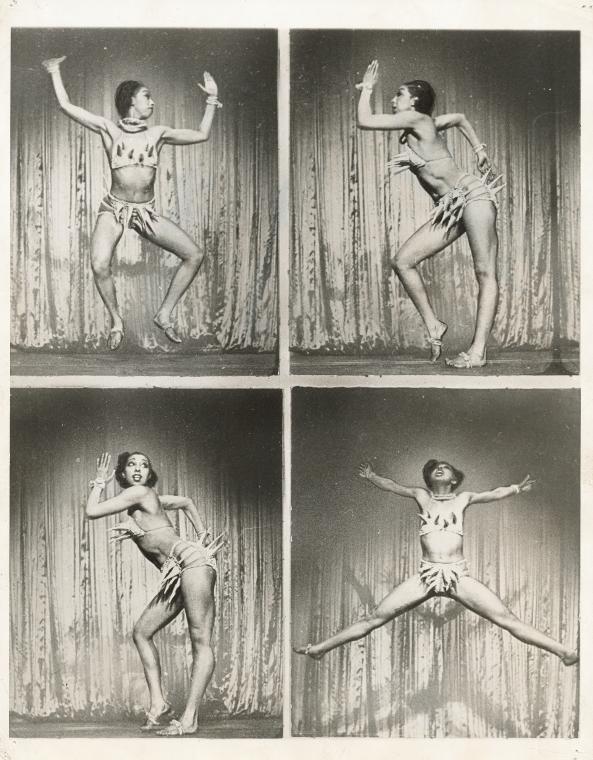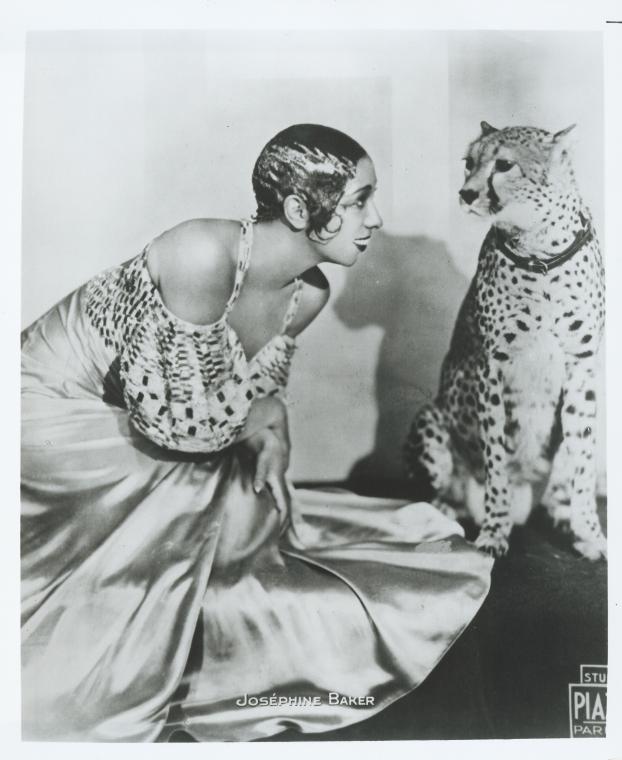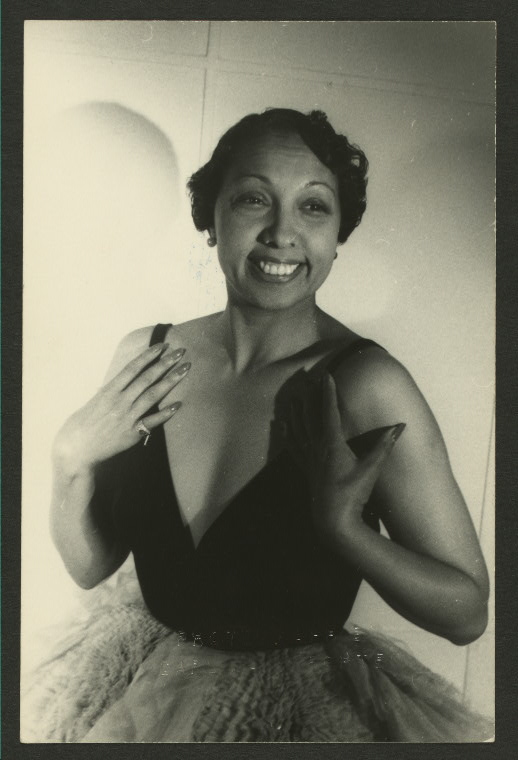Josephine Baker: Entertainer and Activist
This blog post was authored by Alexander Huaylinos , an intern at Lincoln Center for the Performing Arts.

Josephine Baker (b. June 3, 1906) was a theatrical virtuoso known worldwide for her eclectic career as a performer, World War II spy, and civil rights activist. As one of the most admired African American performers of the 20th century, Josephine made full use of her celebrity status to bravely call attention to discriminatory racial practices in the United States and Europe. Her illustrious career serves as an inspiration for how the performing arts can spark joy and catalyze social change today.
Music and dance were a beloved part of Josephine Baker’s world since her youth in St. Louis, Missouri. Whenever she could spare the cost for tickets, Baker would visit the Booker T. Washington Theater, a Black vaudeville house, to immerse herself in the captivating performances of regulars Ma Rainey and Bessie Smith. On Saturdays, young Baker would entertain and perform with the children in her community as she moved her arms and legs alongside the rhythm of the music played by her friends and neighboring musicians.
In 1919, Baker joined a trio of instrumentalists called the Jones Family Band while working as a waitress at the Old Chaffeur’s Club. The band invited Baker into their group after seeing a song and dance routine she would often perform for customers during her breaks. After a series of performances at cafes and restaurants across St. Louis, the Jones Family Band booked a short-term gig at the Booker T. Washington Theater and Baker made the audience laugh uproariously on opening night with her natural comedic talents. Following this performance, Baker toured with the Dixie Steppers, a vaudeville troupe, as a comic performer across the southern United States. The Dixie Steppers disbanded in 1921, but Baker quickly found work in the chorus of the Broadway musical Shuffle Along.
New York City in the Roaring Twenties was home to many influential and revolutionary artists, several of whom Baker would come to study and learn from in her determination to perfect her artistic craft. After Shuffle Along closed in 1924, Josephine appeared briefly in a few comedic scenes in the musical The Chocolate Dandies and later worked at the infamous Plantation Club where she would earn her big break.
One evening, a producer named Caroline Dudley visited Baker at the Plantation Club and asked if she would come to Paris to star in La Revue Negre. She accepted the offer and became an overnight sensation in Paris. La Revue Negre premiered on October 2, 1925 and was so successful that the box office was sold out for ten weeks straight. French critics praised Baker as the “Black Venus” for her glamorous wardrobe and energetic Charleston dance. Her performance was so popular that La Revue Negre toured in Brussels for a week at the Cirque Royal, and in Berlin at the Nelson Theatre. Although Josephine’s most iconic performance is her "Danse Sauvage" number where she danced across the stage in a banana skirt.
Baker flourished on the European stage and became a successful entertainer who reconceptualized the image of Black performers through her unique dancing style and sophisticated costumes. Her work helped Black entertainers come to be recognized as artists. Baker was also an avid animal lover and, in the early 1930s, was gifted with a pet cheetah named Chiquita. She would take Chiquita out on leisurely strolls around Paris much to the excitement and dismay of some lucky pedestrians.
Despite her fame in Europe, Baker met unfair criticism by American audiences who failed to recognize her talents due to discomfort with a sophisticated African American woman who spoke French. Her 1936 performance in the New York showing of Ziegfeld Follies received discriminatory and dismissive reviews from the New York Times. Baker’s experiences performing in the United States compelled her to actively confront racial discrimination thereon.
At the onset of Nazi Germany’s invasion of France during World War II, Baker joined the French Resistance and, making full use of her status as a world-renowned entertainer, relayed information on Axis troops to the Allies as she performed on European stages in the middle of enemy territory. She stealthily transcribed enemy intel onto her musical scores with invisible ink and delivered the scores back to French officials. For her courageous wartime service to France, she was awarded the Cross of Lorraine by General Charles de Gaulle in 1943 as well as the Legion of Honor and the Croix de Guerre in 1961.
Upon further visits to the United States during the 1950s and 1960s, Baker willfully and publicly advocated for civil rights. She refused to perform for segregated audiences and demanded equal treatment as an entertainer at elite venues. When the New York Stork Club refused her service, she filed a complaint with the New York City police department and organized a protest against the Stork Club’s discriminatory practices with the backing of the NAACP.
Activism became a core aspect of Josephine Baker’s work in the latter half of her life. In 1963, she spoke at the March on Washington for Jobs and Freedom to deliver a speech on her experience as a Black woman and entertainer. In both her professional and personal life, Baker made it her mission to prove that people could live in relative peace and harmony no matter the color of their skin. She continued to perform on stage and fight racial injustice well into the 1970s until her death on April 12, 1975. Her story calls upon a legacy of performance and activism that reminds the artists today that they also have the power to shape history for the better.
“I am not a young woman now, friends. My life is behind me. There is not too much fire burning inside me. And before it goes out, I want you to use what is left to light that fire in you. So that you can carry on, and so that you can do those things that I have done. Then, when my fires have burned out, and I go where we all go someday, I can be happy.” — Josephine Baker (1963) at the March on Washington for Jobs and Freedom
Further Reading:
- Caravantes, Peggy. The Many Faces of Josephine Baker: Dancer, Singer, Activist, Spy. Chicago Review Press, 2015.
- Dudziak, Mary L. "Josephine Baker, Racial Protest, and the Cold War." The Journal of American History 81, no. 2 (1994): 543-570.
- Schroeder, Alan, and Heather Lehr Wagner. Josephine Baker: Entertainer. Infobase Publishing, 2009.
Read E-Books with SimplyE
 With your library card, it's easier than ever to choose from more than 300,000 e-books on SimplyE, The New York Public Library's free e-reader app. Gain access to digital resources for all ages, including e-books, audiobooks, databases, and more.
With your library card, it's easier than ever to choose from more than 300,000 e-books on SimplyE, The New York Public Library's free e-reader app. Gain access to digital resources for all ages, including e-books, audiobooks, databases, and more.
If you don’t have an NYPL library card, New York State residents can apply for a digital card online or through SimplyE (available on the App Store or Google Play).
Need more help? Read our guide to using SimplyE.


